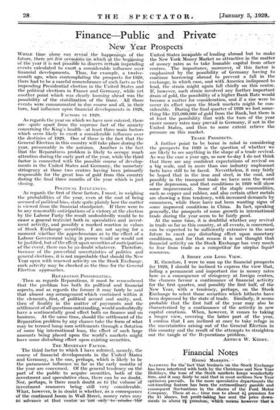THE MONETARY FACTOR. The third factor to which I have
referred,•namely, the course of financial developments in the .United' Statei and Germany, is the one, perhaps, which is likely to be the paramount influence "so far as the early months- :of the year are concerned:. Of the general tendency- on-the part of the public to acquire securities, both of the investment and speculative class, there can be no doubt: Nor, perhaps, is there much doubt as tii, the yolurne7Of investment resources being still very considerable. What, however, Is in doubt is whether,lis a-consequence of the continued boom in Wall. Street, money rates may Sd idvande 'at - that 'centre •-aVirot --.01*0-4er.-Tetirtiei; dtife United States incapable of lending abroad but to make the New York Money Market so attractive in the matter of money rates as to take loanable capital from other centres. The importance, moreover, of this factor is emphasized by the possibility of Germany having to continue borrowing abroad to prevent a fall m the exchange, in which case, and with America indisposed to lend, the strain might again fall chiefly on this centre. If, however, such strain involved any further important drain of gold, the possibility of a higher Bank Rate would become a matter for consideration, and if a rise were to occur • its effect upon the Stock markets might be con- siderable. During the final quarter of 1928 we lost some- thing like £25,000,000 of gold from the Ba.nk,-but there is at least the possibility that with the turn of the year easier money rates may_ prevail in Germany, if not in the United States, and thus to some extent relieve the pressure on this market.






































 Previous page
Previous page